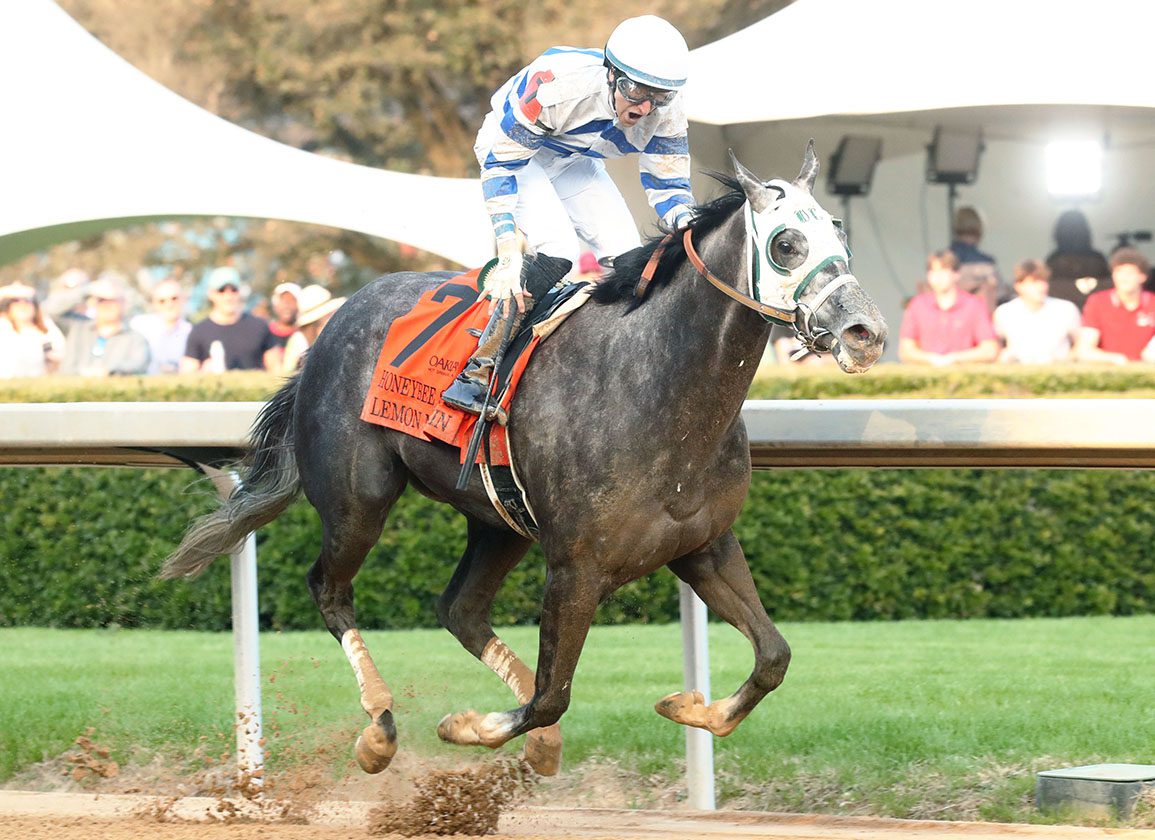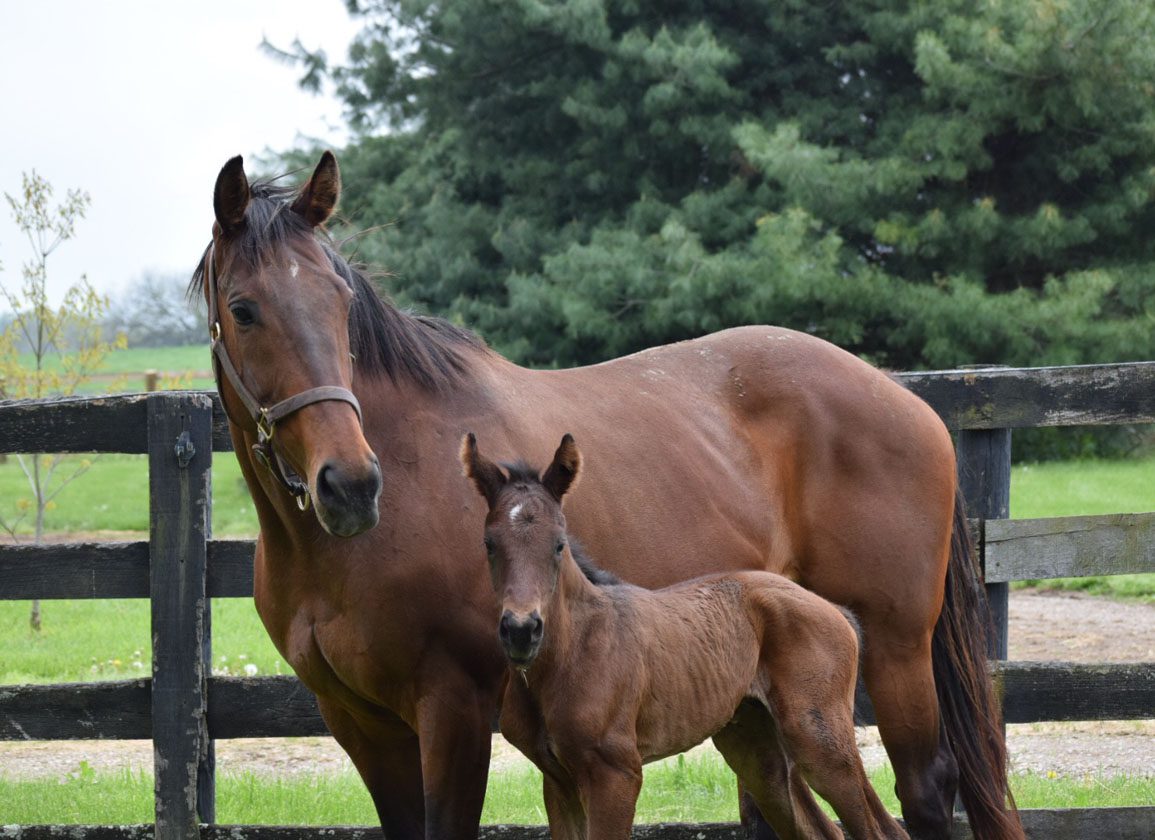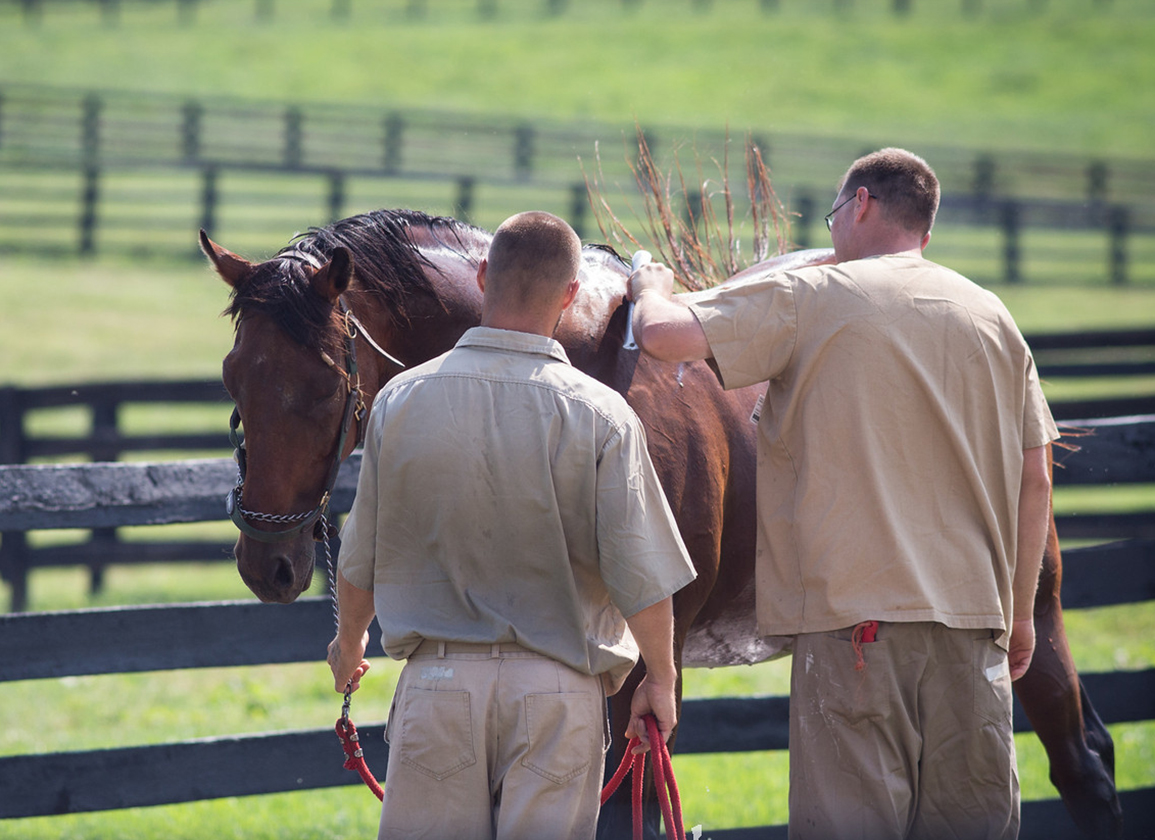What started out as a normal, busy Saturday in February at Shawhan Place quickly turned into an unforgettable day for the Paris-based farm when two horses foaled and raised at Shawhan celebrated breakout victories. First, fan favorite Senor Buscador (Mineshaft)–owned by Shawhan's longtime client Joey Peacock Jr.–won the $20 million G1 Saudi Cup. A few hours later Lemon Muffin (Collected) broke her maiden in the GIII Honeybee S.
The entire Shawhan crew was ecstatic, but two team members in particular were especially over the moon.
Let's start with Teddy Kuster, who co-founded Shawhan nearly 20 years ago. Lemon Muffin's win at Oaklawn was particularly memorable for the octogenarian as he co-bred the filly.
“When you've been in the horse business for as long as I have and you have two horses like that in one day, it's phenomenal,” Kuster enthused. “I mean, you don't do that as a small breeder. After Senor Buscador I said, 'Well this is good even if we just hit the board with the other one.' When Lemon Muffin came on at the end I was just flabbergasted. I was by myself hollering and having a good time.”
Sold by Shawhan Place as a yearling for $20,000 and pinhooked for $140,000, Lemon Muffin had been knocking on the door of getting that maiden win for some time. She ran second four times over the course of three months before earning 50 points on the road to the Kentucky Oaks with her three-and-a-half length Honeybee score for trainer D. Wayne Lukas and owner Aaron Sones.
“She would run second all the time, just keeping running second, but I said that Wayne Lukas will get her going somewhere and he did,” Kuster said proudly. “You break your maiden in a Grade III race, that doesn't happen very often.”
Lemon Muffin is a second-generation homebred for Kuster, who was KTFMC Farm Manager of the Year in 1986.
In 1990, Claiborne's farm manager Gus Koch–the father of Shawhan's co-founder Matt Koch–wrote Kuster a letter telling him about a well-bred, unraced filly that was going to go through the ring at the Keeneland January Sale. Kuster purchased that Claiborne homebred, Fee (Spectacular Bid), for just $9,500.
Fee was responsible for several stakes horses including MGSW High Stakes Player (High Brite). Kuster sold the majority of her offspring but retained the last filly she produced, Pelt (Canadian Frontier).
Now 18 years old, Pelt is responsible for five winners, with Lemon Muffin being her first stakes winner. The mare has a yearling filly by Complexity and is barren this year, but was just bred to Cairo Prince.
Lemon Muffin ranks near the top of the list of talented horses that Kuster has bred, but he is also the breeder of Hilda's Passion (Canadian Frontier), a Grade I winner and the dam of former WinStar sire Yoshida (Jpn).
Kuster sold Hilda's Passion as a yearling before she went on to become a five time graded stakes winner, including the 2011 GI Ballerina S., and then sell for $1.225 million to Katsumi Yoshida. Kuster figured he probably wouldn't have much connection to the mare again, but pretty soon her son Yoshida rose to the top of the game in the U.S. Kuster is now a strong supporter of Yoshida, who has his first 3-year-olds this year.
For Kuster, the results of this weekend were dimmed only by the absence of the person who has always watched races alongside him. Last June, his wife Betsy passed away at the age of 80.
“My wife and I were in this together and we always bred as Mr. and Mrs. Theodore Kuster,” he said. “She and I were very close and had been married over 55 years. She liked the horses and enjoyed going to the races. [This weekend] she would have been very excited and would have said, 'I told you so. It would happen. I told you so.' She was always my number one supporter.”
Asked about the possibility of seeing Lemon Muffin get to the Oaks, Kuster said, “I thinks she's got a good shot at getting there and if so, I'll be there.”
So what about the other star of the show for Shawhan Place, Senor Buscador?
Courtney Schneider, Shawhan's broodmare manager and director of sales, has long been regarded as president of the Senor Buscador fan club. Schneider foaled the son of Mineshaft, like she has for all but one of his siblings, and has tuned in to every one of his races over the past five years. The Saudi Cup victory was no exception.
“You go into weekends like that hoping for the best, but you don't expect to come out with wins like that,” Schneider said. “For myself personally, when Senor Buscador hit the wire I was in instant tears. He's very special. With Lemon Muffin as well, I foaled and raised her, so to have a weekend like that was just truly unbelievable.”
Senor Buscador has amassed seven wins from 18 career starts and boasts almost $12 million in earnings as he now points to the G1 Dubai World Cup.
Schneider said she's itching to book a plane ticket to Dubai for next month if foaling season will allow her to get away.
“I've traveled to follow him from very early on,” Schneider said. “I flew to New Orleans when he ran in the Risen Star. I was at Churchill when he won the GIII Ack Ack S. in 2022. It's very special for me to have clients that will allow me to still be a part of everything and to follow these horses, because that's why I do it–for the love of the horse.”
Senor Buscador's dam Rose's Desert (Desert God) has been the broodmare of a lifetime for the Peacock family. A homebred for Joe Peacock Sr., Rose's Desert was a seven-time stakes winner in New Mexico, but her resume continued to expand every year of her breeding career as her first four foals all earned stakes victories.
The Peacock family has never sold one of her foals, although they did send her first foal Runaway Ghost (Ghostzapper) through the ring as a yearling only to snap him back up after he RNA'd and race him in their own silks.
The winner of the 2018 GIII Sunland Derby, Runaway Ghost was pointing for the GI Kentucky Derby until he suffered a fracture to his shin. The Peacock family had already traveled from their home state of Texas up to Kentucky, so when they no longer had a Derby contender to watch they stopped by the farm to visit their star mare. Rose's Desert was due to foal any day and she of course waited until the morning after they left, but in their family photo with the mare, she is carrying none other than Senor Buscador.
The mating proved to be a special one in more ways than one as it was the last of Rose's Desert's matings that Joey Peacock Jr. picked out with his father before his passing.
Schneider said this foal was a standout from the start.
“I found a text that I had sent to Joey when he was just a few weeks old saying, 'Oh my gosh, he's out here running laps around everybody else in the field.' For him to run laps around everybody else in a $20 million race is just mind blowing now. But he was always one that was forward and he was a little bit of a different model from her typical foals. He had a little bit more leg, a little bit leaner, a little more athletic than the rest of them.”
But all of Rose's Desert's foals have proven their talent on the racetrack. After her four straight stakes winners, the mare was barren for two years. Her 3-year-old of this year, Aye Candy (Candy Ride {Arg}), won on debut on Nov. 28 at Zia Park and that filly's 2-year-old half-sister Rose A (Hard Spun) recently joined the Todd Fincher barn.
Rose's Desert has a yearling colt by Authentic called The Hell We Did (named after how when Joe Peacock Sr. heard what the family had named Senor Buscador, he exclaimed, 'The hell we did!'). She is currently in foal to Into Mischief and will be bred back to Uncle Mo.
“I think she gets knocked a little bit being a New Mexico-bred, but if you go and look at her pedigree, it's deep with Fappiano and all these really good racehorses,” Schneider explained. “Her foals all normally come in plain brown wrappers. I wouldn't say necessarily right off the bat that they would win any beauty contests, but they're big, strong individuals and they've proven that they run.”
Rose's Desert's legacy now continues as her oldest daughter Our Iris Rose (Ghostzapper), a dual stakes winner for the Peacock family, is now a producer. She recently had her first foal, a colt by Curlin.
“I'm very exciting for what the family has coming,” Schneider said. “Rose's Desert has been such a special mare for the Peacocks. It's great because we've had the entire family. To have a client like that who keeps the family here and keeps us involved is incredibly special. It says a lot about their trust in us that they've had this much success and they've stuck with us just as they've stuck with Todd Fincher. I think that speaks volumes to the character they have.”
For a farm with less than a dozen employees that will foal around 50 mares this year, these resent results are significant. Schneider admitted that they aren't quite used to the limelight.
“It's exciting though, because everybody here has worked so hard for so many years,” she explained. “Not that we necessarily didn't get the recognition we deserved before, but just to see this come through, it's a little bittersweet but just very humbling as well. We do this because we love the horses. We all work hard and it's nice to see all that pay off.”
The post Shawhan Place Riding High After Memorable Weekend appeared first on TDN | Thoroughbred Daily News | Horse Racing News, Results and Video | Thoroughbred Breeding and Auctions.





